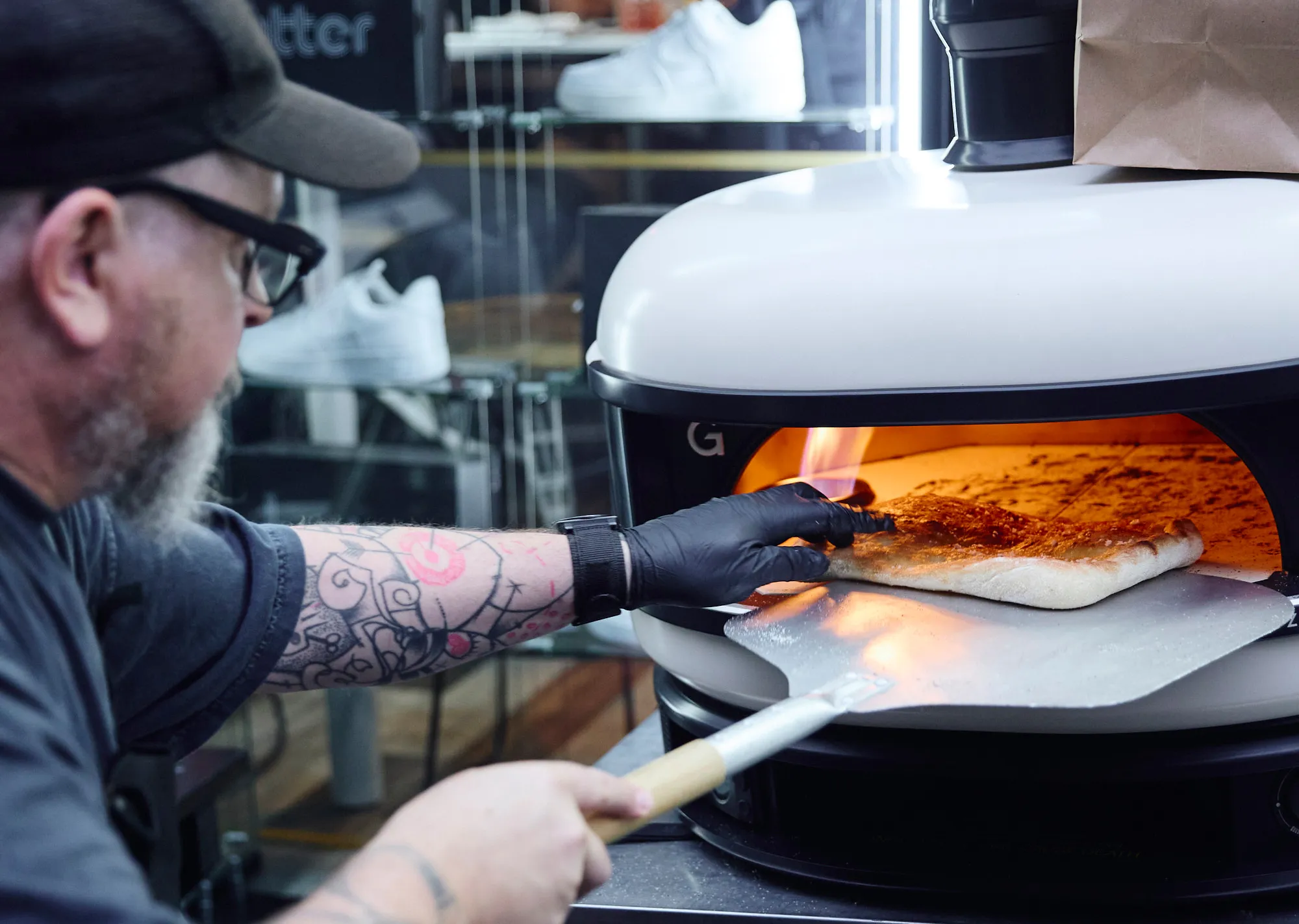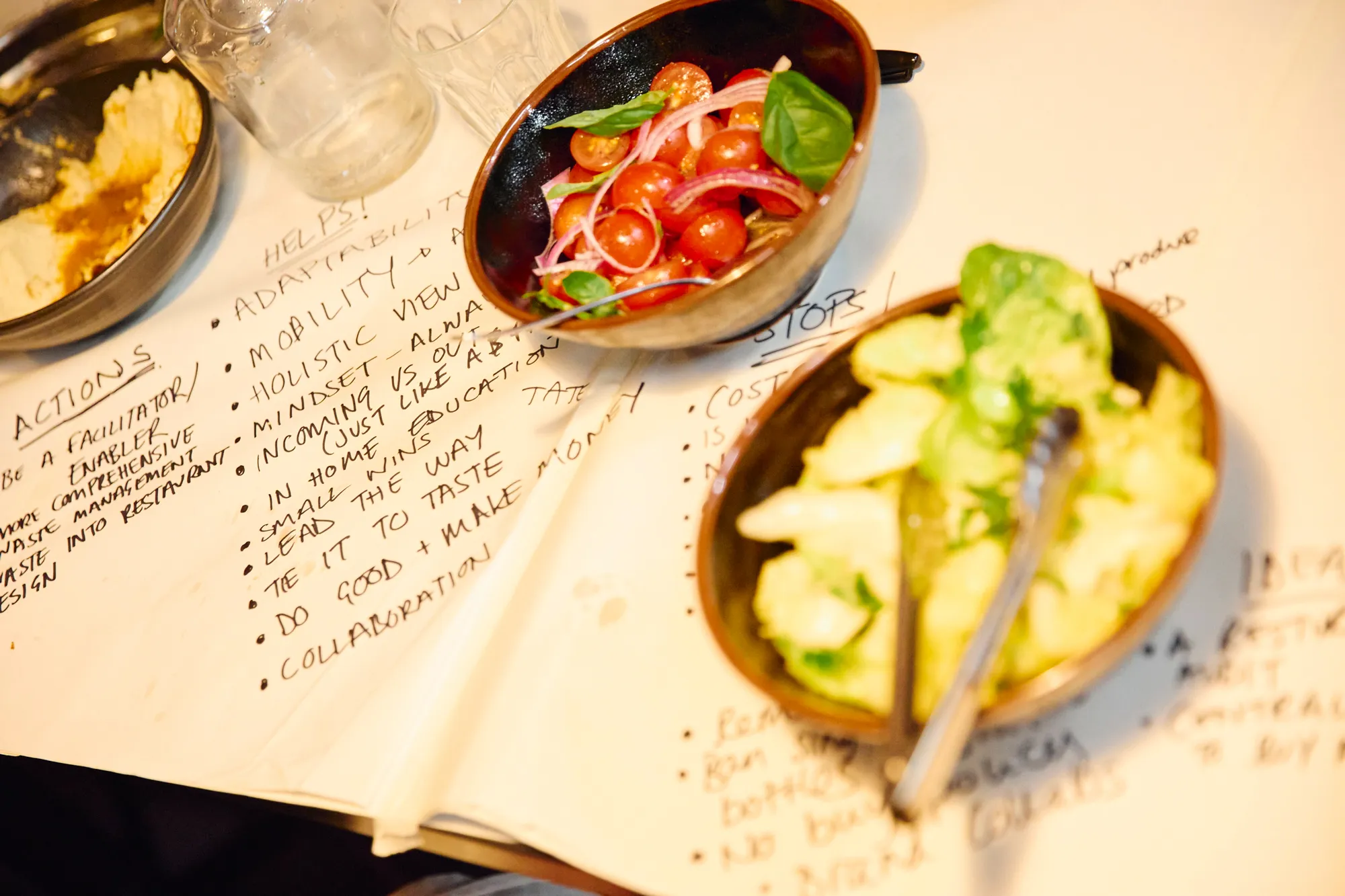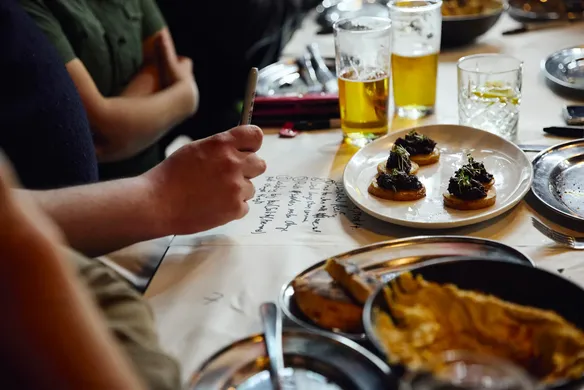Surry Hills restaurant Butter has that hip-hop swagger. Their window drips with drool-worthy kicks. Their tagline is “Fried Chicken. Hip-hop. Champagne. Sneakers.” (Real champagne, btw: Veuve Cliquot, Dom Perignon.) They host DJ nights and generally like to have fun. Wu-Tang Clan, Post Malone, A$AP Ferg and the late Juice WRLD have all eaten there.
Led by executive chef Julian Cincotta (formerly of Rockpool Bar & Grill and Nomad), Butter is also serious about its sustainability. Recently teaming up with Square to put on two evening events that gave over 50 diners the chance to experience a menu built around food that would otherwise have gone in the bin. The event bought together some of Sydney’s most creative hospitality brands, who donated their expertise and waste-busting ingredients.
We asked Julian for his top five tips to help other restaurants looking to reduce their food waste and be more sustainable.
Before we get into that, it’s worth revisiting why sustainability is important for the food industry. “Food waste feeds climate change,” as OzHarvest founder Ronni Kahn says. About a third of all food produced for human consumption gets wasted. If this lost food were a country, it would be the third-largest producer of carbon dioxide in the world, behind the USA and China.
What Butter is doing stands out not only because of the issue’s urgency but also because it’s operating in the fast-casual segment of the restaurant industry, which isn’t always known for its care around sustainability.
“Yeah, it can be a problematic industry,” Julian says.
“I think there are a lot of reasons for that and it’s no-one’s fault particularly. Margins are tight, there are never enough hours in the day, there are staffing issues, there are customers to feed and events to run. It never ends!”
“I guess all we at Butter are doing differently is actively making it something we focus on and try to be better at.”
Without further ado, these are Julian’s top five tips for reducing food waste in your restaurant.

1. Separate your waste
It begins with reducing the waste that goes to landfill by separating recyclables and food waste. Once you’ve taken out recyclable plastics, aluminium cans and glass bottles, you might find that a lot of what’s left is vegetable matter.
“On average, 50–60% of the weight of waste in a restaurant is organic waste – so don’t send it to landfill,” Cincotta says.
“At Butter we have a separate organics bin and all of our organic material gets separated into that bin. When organics go into landfill, they don’t break down and instead produce more toxic gasses.”
Food scraps can be composted or used in word farms. Depending on your area, your council may collect this valuable organic waste. Or you may be able to establish a circular relationship with one of your suppliers, where organic matter is composted before being used to nourish vegetables or feed crops.
Surplus stock that’s fit for human consumption can be donated to food rescue organisations like OzHarvest that will make sure it reaches people in need.
2. Do a food waste assessment
As Julian says, a food waste assessment is “where you look at where your food waste is coming from: prep waste, plate waste or spoilage”.
Depending on where you are, you may be able to get a free assessment from your local council or state government’s environmental body.
“We did a food waste assessment with City of Sydney and we found that most of our waste was plate waste, i.e. things left over after the customer’s meal. So we looked at reducing our portion sizes a bit to bring this down,” Julian says.
In New South Wales, Bin Trim, run by the Environment Protection Agency, is another good program to look into, Julian says. The EPA website has plenty of useful examples of how businesses are both doing their bit for the environment and saving money on their waste collection.

3. Streamline your menu
Keeping your menu small and using all the parts of what you get in will help you lower your prep waste.
“Our menu is tight! Our only real prep waste of food is corn husks – we pretty much use 100% of everything else we get in,” Julian says.
Examine your inventory and purchasing practices so you can identify and eliminate high-waste offenders. Using local and seasonal produce is another good way to reduce food miles (which mean carbon emissions) while also offering your customers a fresh, revolving menu.
Square for Restaurants’ reporting tools can help you see which menu items are most popular with your customers, making it easier for you to match your ordering to your output.
4. Talk to your suppliers
Choose suppliers that are focused on low-waste packaging and sustainable production. Or encourage the companies you already work with to lift their game.
“If you don’t ask and push them for something different, nothing will change,” Julian says.
“This is a slow one, but we just keep asking. One of our big wins was working with our chicken supplier so that all our chicken now comes in reusable crates. They charge us $10 when we get them in and refund that money when they pick them up on the next delivery.”
5. Spread the word
It’s great if you can reduce waste and implement sustainability drives in your own business. But to scale, for this to become a mainstream movement, it’s even better if you can bring your peers along with you. Or maybe you need a bit of help – don’t be afraid to ask for advice if you need it.
“Talk to and share ideas with as many other businesses as you can, even in other industries,” Julian says. “We have learnt lots from businesses who do something very different to ours!”
“We were fortunate enough to get to run a series of dinners with Square where we brought together a range of people to talk about sustainability over dinner and drinks. It wasn’t a presentation or Q&A session but was more about bringing people together to openly talk about important issues.”
This article is for informational purposes only and does not constitute professional advice. For specific advice applicable to your business, please contact a professional.
![]()











